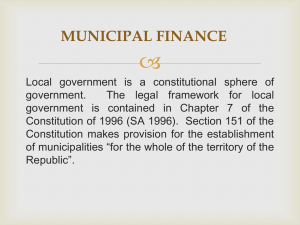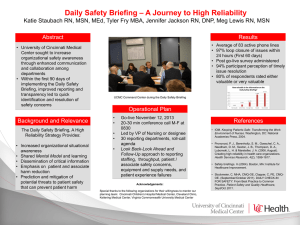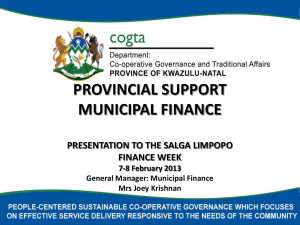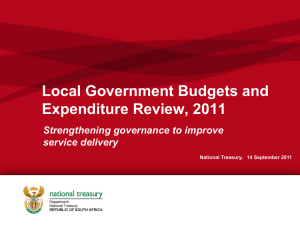Briefing on Local Government Recommendations
advertisement
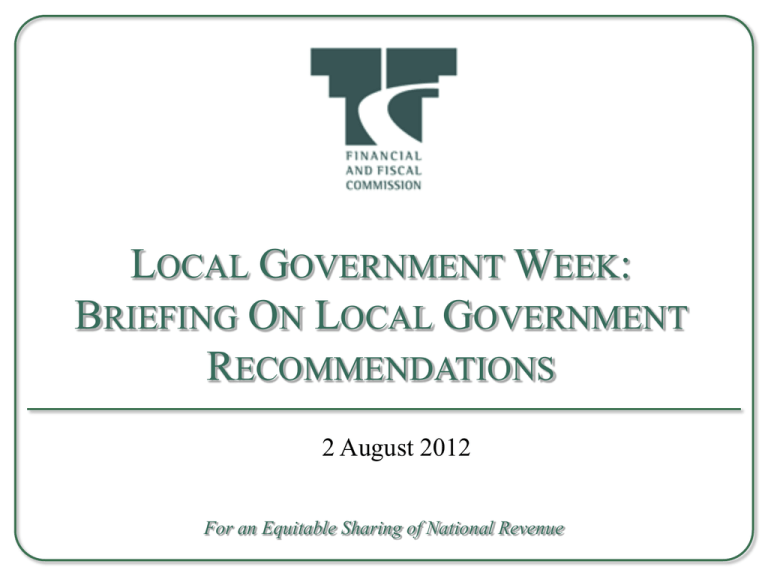
LOCAL GOVERNMENT WEEK: BRIEFING ON LOCAL GOVERNMENT RECOMMENDATIONS 2 August 2012 For an Equitable Sharing of National Revenue LOCAL GOVERNMENT ISSUES • • • • • • • • Inadequate service delivery Backlogs Under-spending, poor planning Inadequate human, organisational or institutional capacity Inadequate repair maintenance Poverty, unemployment Governance challenges Recent Events – Ongoing Local Equitable Share Formula Review of LES formula – FFC public hearings on sustaining municipal finance Briefing on Recommendations Relating to Local Government 2 LGES RECOMMENDATIONS 2011/12 2011/12 Year Recommendat ions Use the institutional component of Local Equitable Share to assist poor municipalities Develop alternative methods of revenue prediction for the RRC Government response Government agreed that changes are required to improve the way the local government equitable share is allocated between municipalities. To assess whether the local government equitable share formula results in an equitable division among individual municipalities (horizontal division) as stipulated in sections 214 and 227 of the Constitution, the formula should be analysed as a whole – rather than subcomponents in isolation. The institutional component has been changed in 2011, adjusting the amount allocated to municipalities in terms of their poverty rate. This means that poorer municipalities will receive increased allocations. Briefing on Recommendations Relating to Local Government 3 LGES RECOMMENDATIONS 011/12 Year Recommendations Remove the step structure of the differentiated tax mechanism of the Revenue Raising Component and develop a flat gradient structure so that municipalities on the outer ends of bands are not treated unfairly Government response In the absence of accurate property valuation rolls for all municipalities and with no official data on economic activity at municipal level, it is very difficult to construct a model that would provide fair estimates of municipalities’ capacity to raise their own revenues. Government agreed to remove the stepped structure from the revenueraising correction and a smooth curve has been used instead to calculate the differentiated “revenue correction” rate applied to each municipality. Briefing on Recommendations Relating to Local Government 4 RURAL DEVELOPMENT AND UNFUNDED MANDATES 012/13 2012/13 Year Recommendations The governance and institutional arrangements for rural development across the three spheres of government needs to be clarified urgently. The Commission recommended that a functional mapping of all rural development activities be undertaken, with specific responsibilities assigned to each sphere of government. The organ of state initiating a general assignment must provide the financial and fiscal implications of a function shift to the Commission for its recommendations to the Minister of Finance in line with Section 3 of the FFC Act 2003 as amended and the Minister of Finance. The Commission tabled a compliance check list for this specific purpose in 2007. All resources associated with delivering a Briefing on Recommendations Relating to Local service associated with a function Government to be shifted are transferred. Governmen t response 5 FINANCIAL MANAGEMENT ISSUES (REVENUE ENHANCEMENT, MUNICIPAL DEBT, OVERSIGHT) 11/12 2011/12 Year Recommendations Government response Adopt standard early warning systems to detect fiscal stress in municipalities and reach consensus on them. National government has an early warning system that monitors municipal finances. This system is anchored by the budget formats prescribed in terms of the municipal budget and reporting regulations, the associated funding compliance assessment (see MFMA Circular 42) and monthly financial reports required in terms of section 71 of the MFMA. National government supported the recommendation that each municipality should have a broad revenue improvement programme in place. National government believes that at this stage there is far more to be gained from improving the accuracy and completeness of municipal billing systems, and putting in place proper customer relations capacity. Legislate, through S43 of the LGMS Act of 2000, revenue collection as one of the key performance areas against which to assess overall municipal performance. Briefing on Recommendations Relating to Local Government 6 FINANCIAL MANAGEMENT ISSUES (REVENUE ENHANCEMENT, MUNICIPAL DEBT, OVERSIGHT) 011/12 2011/12 Year Recommendations Support efforts to estimate the fiscal capacity and fiscal effort of municipalities to dispel the perception that certain municipalities will never be financially viable. Government response The notion that certain municipalities will never be financially viable is a misrepresentation of both the design of the local government fiscal framework and the practical reality of local economies. National government is investigating the issue of developing measures of fiscal capacity – it is by no means a straightforward task given the impact that traditional land and different modes of service delivery have on many municipalities’ rates bases and service revenues. Subject revenue Government supported these recommendations. enhancement programmes to empirical tests that cover changes in (a) effective tax rates (b) tax burdens (c) yield, Briefing on Recommendations Relating to 7 efficiency and overall Local Government fairness FINANCIAL MANAGEMENT ISSUES (REVENUE ENHANCEMENT, MUNICIPAL DEBT, OVERSIGHT) 2012/13 2012/13 2012/13 2012/13 Year Recommendations Government response Municipalities need to improve technical efficiency in utilising Accepted existing resources National and provincial treasuries’ efforts to improve the credibility of municipal budgets through annual benchmarking exercises should continue to be supported. National and provincial government should require and assist municipalities to identify the primary cause of poor performance in billing and revenue collection functions and use the information to design appropriate remedial strategies. Agrees but disagrees that benchmarking documents be made public Government agrees that municipalities should be assisted. NT is training municipalities on revenue management As an interim measure, government should establish and A legislative framework for publish guidelines for municipalities on management of this already exists municipal consumer debt in terms of, but not exclusive to, interest charges, debt impairment and writing off of bad debts. Briefing on Recommendations Relating to Local Government 8 FINANCIAL MANAGEMENT ISSUES (REVENUE ENHANCEMENT, MUNICIPAL DEBT, OVERSIGHT) 2012/13 2012/13 Year Recommendations Government response S64 of MFMA (No.56 of 2003) should be amended to require regular collation and updating of information on indigent residents of a municipal area, as an integral component of municipal revenue management practices. Guidelines have been issued to help municipalities to implement indigent policies National and provincial government should develop and support peer learning and support programmes that assist poorly performing municipalities to leverage experience and best practices of well-performing municipalities, particularly in relation to spending performance, efficiency in using resources, proper debt management and achievement of desired developmental outcomes. NCOP:LOCAL GOVERNMENT WEEK 31 Government agreed. Forums for such exist, eg. CFO’s forums, City Budget Forum JULY TO 3 AUGUST 2012 9 ENVIRONMENT (CLIMATE CHANGE AND DISASTER MANAGEMENT) 012/13 2012/13 Year Recommendations Government should ensure that municipalities develop their own climate change mitigation and adaptation strategies and plans for climate change as part of the Integrated Development Planning process. Government should consider providing municipalities with a performance based conditional which Briefing grant, on Recommendations Relating to Local Government rewards or incentivises actions that are Government response Agreed. DCOG, DEA and SALGA developing planning tool for climate change management More research needs to be done as to how such a grant10 should be HOUSING AND LAND USE 2012/13 2012/13 Year Recommendations Government response Government should conduct a broad-based Government review of the efficacy of current housing accepted finance arrangements in meeting housing recommendation needs within the context of creating sustainable and more compact human settlements. Government should actively and specifically Government agrees pursue development of a more spatially with recommendation and has initiated a compact urban form for cities, by developing new cities support and adopting appropriate policies and programme to assist cities manage built financing instruments. Briefing on Recommendations Relating to Local Government environment 11 INFRASTRUCTURE/REPAIRS AND MAINTENANCE 2012/13 Year Recommendations Government response National government should specifically enforce provisions set out in S74(2) of Municipal Systems Act, such that the basis of municipal tariffs accurately reflects the cost of providing the specific service, as well as conforms to National Treasury expenditure guidelines for repairing and maintaining municipal infrastructure. Government supported proposal. But it may take time to implement proposal since data requirements for this are 12 huge Briefing on Recommendations Relating to Local Government CAPACITY BUILDING INITIATIVES Recommendations In future, all capacity building initiatives should be evaluated by an independent and impartial party and identify lessons that could be taken into account when a new programme is designed and implemented. Capacity building initiatives should target poor performing (distressed) municipalities that have limited capacity to compete in the open market for skills and conditions be set for permanent absorption of such capacity and transfer of skills to permanent municipal employees. Each capacity building programme must have a clear outline of measurable objectives, targets and timelines detailing conditions under which a programme can be withdrawn from a respective municipality and after a detailed monitoring and evaluation of the programme is done. DCOG and NT need to strengthen their capacity to manage and monitor new programmes. There must be an intergovernmental wide common understanding of what constitutes “lack of capacity” within the context of local government and that local government should be central to setting the agenda for capacity building programmes intended for their own improvement. Capacity development programmes should be comprehensive and not only focus on training of personnel and deployment of experts municipalities. Briefing within on Recommendations Relating to They must also focus on other 13 Government organisational and human resource issuesLocal (recruitment and retention of permanent municipal DATA ISSUES 2012 /13 Year Recommendations Data available at local government level should be reviewed to ensure appropriate surveys or alternatives are available to account accurately for changes in demographics and other factors at municipal level Briefing on Recommendations Relating to Local Government Government response Agreed: The Local Government Data forum was established in response to the need to rationalise data collection from LG. 14 PROGRESS ON THE REVIEW OF THE LES FORMULA • Task team established to review LES formula – – – – – National Treasury DCoG SALGA FFC Secretariat StatsSA • Revised principles and objectives of formula – Compiled two discussion documents for comments • Principles more focused and objectives more tangible – Opportunity given to all municipalities to comment on process and discussion documents Briefing on Recommendations Relating to Local Government 15 PROGRESS ON THE REVIEW OF THE LES FORMULA • All written municipal comments received in June • Team currently working on new formula based on principles, objectives and municipal/stakeholder input – Proposed new formula to be taken to department and organisation heads by end August • Consultation on proposed new formula to be undertaken with municipalities and other stakeholders in September • Final proposed formula will be presented at Budget Forum in October Briefing on Recommendations Relating to Local Government 16 LGES-GENERAL COMMENT • The LGES review suggested by government has only focussed on the formula • What is needed is a broad review of the Local Government Equitable Share or the entire Local Government Fiscal Framework • The FFC through the Public hearings is in the process of doing this and will advise Government on this when work is complete Briefing on Recommendations Relating to Local Government 17 FFC PUBLIC HEARINGS ON SUSTAINING MUNICIPAL FINANCE • FFC undertook a set of public hearings to understand and propose options for the problems inherent in Local Government Fiscal Framework – Two sets of public hearings took place • First public hearing identified the problem statement and issues hindering sustainable financing of LG • Second public hearing provided a set of options for problem statement identified – Input from process driven largely by stakeholder perspectives • Identified issues from various stakeholders in LG Briefing on Recommendations Relating to Local Government 18 EMERGING CONSENSUS: DIFFERENTIATION AND DEMARCATION • Differentiation – Principle of differentiation agreed upon – Common system of differentiation is required – Context (fiscal capacity, cost efficiency…) vs performance (i.e. fiscal effort, spending efficiency and effectiveness …) – Any demarcation framework to conform to constitutional framework • Demarcation – Develop a system that ensures fiscally sustainable municipalities are created Briefing on Recommendations Relating to Local Government 19 EMERGING CONSENSUS: LGFF AND FUNCTION ASSIGNMENT • Stakeholders proposed a broader definition and criteria for the LGFF – Should include not only transfers, but also own revenue, borrowing and transfers • Cautioned against expecting too much from a redesigned LGFF – A lot of other work (e.g. capacity building and support) is required to improve local government functionality. • Future devolution of fiscal powers should be informed by functional assignments – Functions (of, for example, district municipalities) must be clarified before making any changes to grants Briefing on Recommendations Relating to Local Government 20 EMERGING CONSENSUS: OPTIONS FOR LGFF • Three primary options for the LGFF: – Gap-filling: A system based on gap filling with a primary emphasis on transfers, much as exists currently – Performance based system: with emphasis on incentives, which implies a major shift towards expenditure-side interventions, incentivising own source revenue and capital finance, complemented with conditional transfers. – Range of hybrid options in between • Approaches were discussed as options for the LGFF structure • FFC to finalise a set of recommendations emanating from process and undertake further engagements Briefing on Recommendations Relating to Local Government 21 THANK YOU. Financial and Fiscal Commission Montrose Place (2nd Floor), Bekker Street, Waterfall Park, Vorna Valley, Midrand, Private Bag X69, Halfway House 1685 www.ffc.co.za Tel: +27 11 207 2300 Fax: +27 86 589 1038
